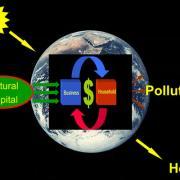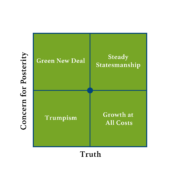Recession — An Opportunity We Should Not Pass Up
by Peter Seidel
We are currently facing a worldwide recession. Many people cannot find employment, and many things are poorly done or not done at all, because businesses and governments say they don’t have the money to fund them. Political and business leaders keep calling for more growth to get us out of this recession. I am not an economist nor do I have a complete understanding of the economy, nevertheless, like the boy who pointed out that the emperor was naked, I see things that strike me as odd.
Perpetually pursuing growth into the future, in a finite space with limited resources, is impossible. We have already exceeded the level of consumption our planet can sustain. According to the Global Footprint Network it would take 1.5 planets like our own to regenerate all the resources humanity now uses and assimilate our carbon dioxide emissions. If everyone lived like the average American, we would require the resources of almost 5 planets. Instead of growing, we need to scale back. Continued growth is suicide for our species. Now this may sound naïve, but why not employ people who have lost their livelihood to do things that urgently need to be done, and do this in a way that puts us back on the road to sustainability?
In trying to answer this question, more questions rise to the surface. How can we create enough jobs? Where do we get the money to pay for them? By focusing on efficiency, as we now do, and raising worker productivity, workers are continually producing more for each hour worked. Under this current economic system, people must consume more and more (at the same time placing more and more burden on the environment) just to maintain jobs. Outsourcing exacerbates employment problems, requiring even more consumption to make up for disappearing jobs. How will we ever return to earlier levels of employment with the increased efficiencies that businesses have introduced during the recession, and without the reckless spending habits people had before the recession? There are some simple ways to turn this around. We can hire more teachers to reduce class sizes in schools and restore subjects that enrich young people’s lives such as, art, music, and physical education. We can maintain our parks and protect the environment better. Employing more police, inspectors of the products we use, and people to review income tax returns would also help.
Shortening the work week and granting longer vacations would also create openings for unemployed workers, and provide more free time for all. As much of our life is spent at work, work should be less stressful, more enjoyable, something one can take pride in, and be adequately compensated for. In short, we should switch from an economy where we are slaves of the system and are obliged to consume more than we need in order keep it going, to one based on meeting human needs within the capacity of our planet.
Where can we obtain the funds to provide full employment in the kinds of jobs I have just described? Today, large numbers of people who are doing financially well simply don’t want to sacrifice for others or the common good, and there are politicians who tell them they don’t need to. When I was growing up, I was taught that it was the American way to pitch in and help one another when things were tough. Farmers helped their neighbors when their barn burned down, and we sacrificed during World War II by raising taxes and forgoing many things. Now we pass the burdens of war on to the socially disadvantaged (from whose ranks we populate our armed forces) and our children (who will end up paying the costs of war). And today our situation is far worse as we head for environmental troubles that will hurt everyone. A moderate tax increase on those who are fortunate enough to have reasonably paid jobs would solve this problem without decreasing the quality of their lives. Much research has shown that when one has enough to live comfortably, has friends, and is happy with what one does, more money does little to increase happiness. Education would help here.
New goals and mechanisms must be developed that put the long-term welfare of the planet, people, and communities above currently held beliefs and short-term profits for a few. We must replace the gross domestic product (GDP) with an indicator that includes the cost of the depletion of nonrenewable resources, pollution, medical bills, natural disasters, commuting, military expenditures, and crime. By the present means of computation, the more a nation pollutes and spends on cleaning it up, the greater the GDP! Instead we must turn to something like the Genuine Progress Indicator (GPI), which starts with the same personal consumption data that the GDP uses, but then adjusts for factors such as the fairness of income distribution, and adds factors such as the value of household and volunteer work, and subtracts factors such as the costs of crime and pollution. Instead of putting our faith in conventional economists who ignore the reality of the world beyond money and the limits of their models, we should turn to a breed of economists and thinkers now totally ignored by governments and business. Ecological economist Herman Daly, David Korten (President of the People Centered Development Forum), Peter Victor (Professor of Environmental Studies at York University), and Tim Jackson (independent advisor on sustainable development to the UK government) are good examples and have recently written books on sustainable economics.
In recent years, there has been an increasing separation of the control of business from the people and communities who are affected by those businesses. At one time business owners and their employees lived within the communities where the businesses operated, and people consumed the food that grew around them. Today, much business is owned by impersonal organizations headquartered elsewhere, and food comes from thousands of miles away. Such arrangements put people out of touch – it becomes very difficult for them to connect their choices to the consequences of those choices. Decisions tend to be based solely on monetary reasons, without regard to environmental and personal concerns. Corporations have only one obligation: making money for their stockholders without breaking the law. We need to initiate feedback systems and controls that bring environmental concerns and humanity back into business decisions.
To reach sustainability we must bring our economy back to reality. Doing so will require us to decrease human population, take money out of politics, return governments to the people, and free the media from concentrated ownership and corporate control. We need to reorient our goals and values. If the public ceased to admire conspicuous consumption and lavish living, and openly recognized the damage associated with such lifestyles, we could do away with harmful overconsumption and develop lifestyles that are healthy from both an environmental and economic perspective.
If we do not reach a level of sustainability, nothing else matters. I believe that a recession, with the suffering that goes with it, and an increased public awareness of environmental problems like those that we now have, is the easiest time to switch to a sustainable economy. Besides, it could be a seamless way to step beyond our recession into a saner, sounder future. If we do not grasp our current opportunity, when will we do what we must do?







Very good post, thanks. Agree that this recession which may actually have been a depression without artificial interventions, is a good time before the train that was headed to doom goes back to the original growth track giving an illusion that everything is “normal”, this is the time when people are open to new thinking (which is actually common sense that has been masked in the rut) and those who believe in degrowth should make a substantial effort now. The perversion of growth economy is clear from day-to-day statements like “I contributed my share to the economy by buying this or that today, I felt good as I helped improve the economy, it will create jobs”. Today machines are doing most of the work as we have automated nearly all production (most jobs are namesake jobs) and those that aren’t automated are increasingly being automated so even existing jobs are increasingly harder to sustain, let alone create new ones, so the thinking that consumption will create new jobs is flawed, it will only move non renewable resources faster to waste without creating any jobs. Another indicator of insanity of growth economy is the exhorbitant amounts of money tied to activities of sales and marketing. The purpose of marketing is to make people familar with a product or service, but now it is being used to somehow persuade the consumer into buying what they don’t need by creative advertising and appealing to the animal instincts (a lot of research into this). I market my company’s product that you don’t need to you and you do the same to me — a whole bunch of people fooling each other and willing to be fooled, I would say the growth economy is successfully manufacturing large amounts of foolishness.
The UK’s Comprehensive Spending Review has just revealed its deeply regressive colours :
the poorest 10% will bear the brunt to cuts in public services; thousands of public sector jobs will go,ostensibly to make way for a business-led revival in growth and consumption.
Areas in the UK which are already impoverishes will fall further down the ladder :increasing inequality and rising social tensions.
We have been told that in the interests of fairness, all have to take their share of the pain, but, as usual, the finance warriors will escape relatively unscathed while benefits are withdrawn from the poorest and those in work have to do more for less.
Same old, same old.
The richest view taxes as an optional nuisance and not as the cement which binds societies together, and which provide the revenues necessary to redress our increasing social and environmental malaise.
Splendid article.
Well said, but unfortunately much of what you say is the cornerstone of what is known command economy and is political suicide in this country.
As much as the Tea Party and conservatives drive me crazy, dealing with our debt load is an enormous problem that has to be dealt with, and unlike they say, has no easy solutions.
Unfortunately the last time the USA encountered such a high debt/GDP load was after WW2 when we were the last remaining industrial country to supply the rest of the world with their needs.
We also had a petroleum surplus we exported.
Now we import 2/3 of our energy and compete with at least 3 or 4 other countries/regions for the worlds business. Its a losing battle for sure, but the alternatives won’t happen from the top.
What is happening now, is that there are those of us who understand we will be living with less in the future, and those who still don’t believe it (many tea partiers and others).
Many folks I know are using the recession as an opportunity to simplify and slow down. Getting back to things like gardening to grown their own food and save on the food budget. More potlucks to gather with friends and share a good meal and conversation. Shorter local vacations and three day weekend trips to appreciate the beauty within a few hundred miles of home. Hiking in nature and combining fitness and fresh air with appreciation of nature. Book clubs…
Less consumption and more of appreciation of all that we have and the intangibles.
excellent, analysis, as usual. perhaps we will get back to sustainability before it is too late. there are signs, as is noted above, that the sands are shifting
Excellent analysis, Peter!
However, this may come under the category of “Don’t wish for what you want,because you may get it.”
Every single legitimate economist from either the right or the left now agrees that to get the economy moving again, we need big time deficit spending, a la Paul Krugman. But no matter how the election comes out, the American people have made it clear that they want just the opposite, which will result in millions more being laid off and stagnation that may continue for a generation.
For instance, Governor Christie of NJ gained many points with the electorate by cancelling the Holland tunnel project, which will cost thousands of jobs over a period of years. The American people have made it clear that they want to cut back on all services and demolish our educational system from K through graduate school.
Nobody is more unpopular these days than state and federal employees, so we will see millions of these individuals added to the ranks of the unemployeed in the coming months as the stimulus expires.
In short, this will perpetuate our flat rate of growth in carbon emissions that we saw in 2009 (actually it dropped) but the attendant misery is something no rational person would wish for. But who ever accused the Republicans of rationality?